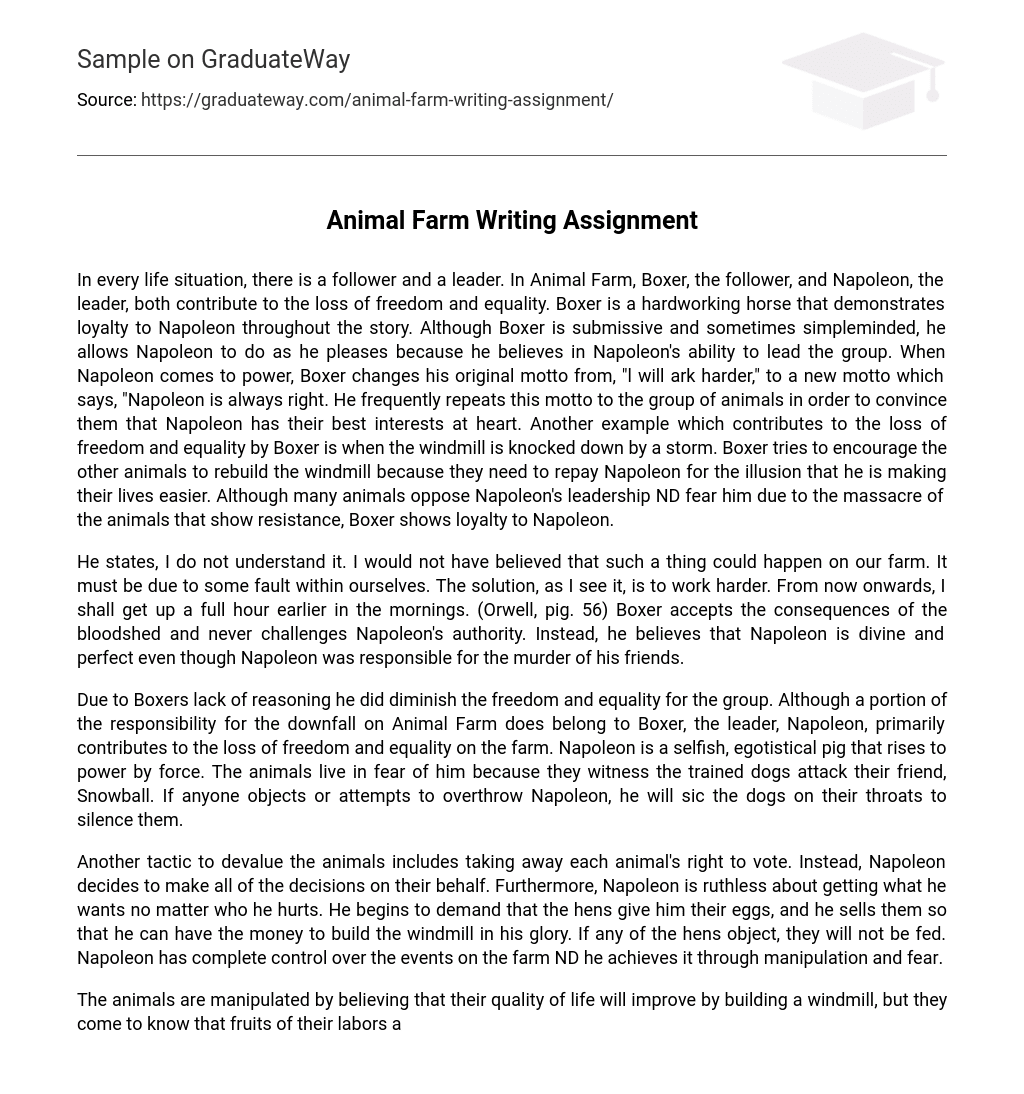In every life situation, there is a follower and a leader. In Animal Farm, Boxer, the follower, and Napoleon, the leader, both contribute to the loss of freedom and equality. Boxer is a hardworking horse that demonstrates loyalty to Napoleon throughout the story. Although Boxer is submissive and sometimes simpleminded, he allows Napoleon to do as he pleases because he believes in Napoleon’s ability to lead the group. When Napoleon comes to power, Boxer changes his original motto from, “l will ark harder,” to a new motto which says, “Napoleon is always right. He frequently repeats this motto to the group of animals in order to convince them that Napoleon has their best interests at heart. Another example which contributes to the loss of freedom and equality by Boxer is when the windmill is knocked down by a storm. Boxer tries to encourage the other animals to rebuild the windmill because they need to repay Napoleon for the illusion that he is making their lives easier. Although many animals oppose Napoleon’s leadership ND fear him due to the massacre of the animals that show resistance, Boxer shows loyalty to Napoleon.
He states, I do not understand it. I would not have believed that such a thing could happen on our farm. It must be due to some fault within ourselves. The solution, as I see it, is to work harder. From now onwards, I shall get up a full hour earlier in the mornings. (Orwell, pig. 56) Boxer accepts the consequences of the bloodshed and never challenges Napoleon’s authority. Instead, he believes that Napoleon is divine and perfect even though Napoleon was responsible for the murder of his friends.
Due to Boxers lack of reasoning he did diminish the freedom and equality for the group. Although a portion of the responsibility for the downfall on Animal Farm does belong to Boxer, the leader, Napoleon, primarily contributes to the loss of freedom and equality on the farm. Napoleon is a selfish, egotistical pig that rises to power by force. The animals live in fear of him because they witness the trained dogs attack their friend, Snowball. If anyone objects or attempts to overthrow Napoleon, he will sic the dogs on their throats to silence them.
Another tactic to devalue the animals includes taking away each animal’s right to vote. Instead, Napoleon decides to make all of the decisions on their behalf. Furthermore, Napoleon is ruthless about getting what he wants no matter who he hurts. He begins to demand that the hens give him their eggs, and he sells them so that he can have the money to build the windmill in his glory. If any of the hens object, they will not be fed. Napoleon has complete control over the events on the farm ND he achieves it through manipulation and fear.
The animals are manipulated by believing that their quality of life will improve by building a windmill, but they come to know that fruits of their labors are for nothing. While Napoleon is perceived to be a leader, the only thing that he improves is his own quality of life. Ultimately, Napoleon’s actions turn him into a blood thirsty tyrant that causes the community a loss of freedom and equality on the farm. Both the characteristics of Boxer and Napoleon contribute to the loss of freedom and equality on Animal Farm.
Boxer and Napoleon both have a strong work ethic, but Napoleon uses that work ethic for his own personal endeavors. Boxer never understands the true nature of Napoleon, which results in his untimely demise. Orwell uses satire to demonstrate that the animals behave like people in society, and people repeat their mistakes by entrusting all power to a single person. Throughout history, there have always been individuals that rose to power and thought that they are better than everyone else. This is still true now. If allowed, that individual will use others to rise to power and rule by fear.





